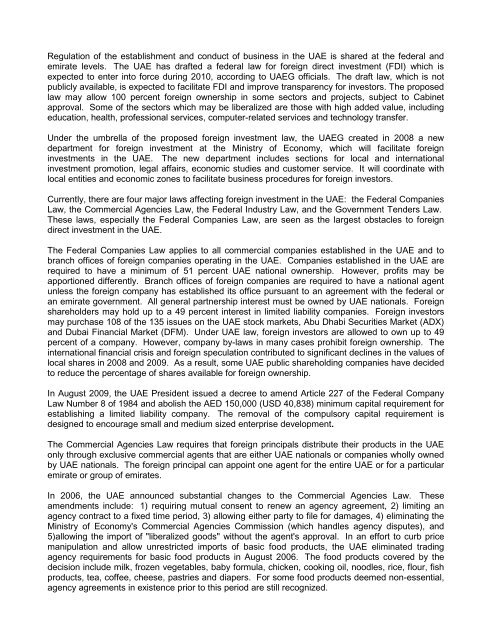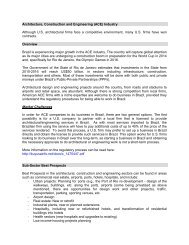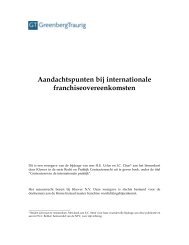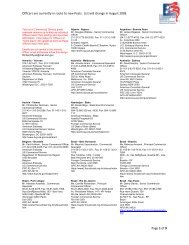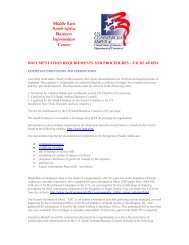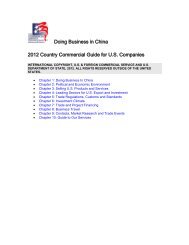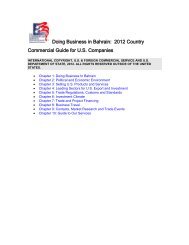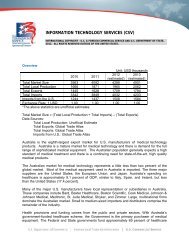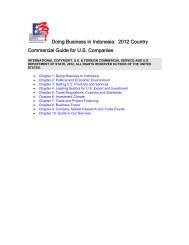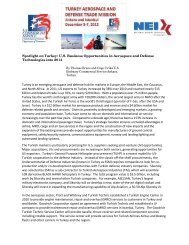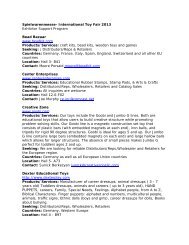UAE Country Commercial Guide 2012 - Export.gov
UAE Country Commercial Guide 2012 - Export.gov
UAE Country Commercial Guide 2012 - Export.gov
- TAGS
- export.gov
Create successful ePaper yourself
Turn your PDF publications into a flip-book with our unique Google optimized e-Paper software.
Regulation of the establishment and conduct of business in the <strong>UAE</strong> is shared at the federal and<br />
emirate levels. The <strong>UAE</strong> has drafted a federal law for foreign direct investment (FDI) which is<br />
expected to enter into force during 2010, according to <strong>UAE</strong>G officials. The draft law, which is not<br />
publicly available, is expected to facilitate FDI and improve transparency for investors. The proposed<br />
law may allow 100 percent foreign ownership in some sectors and projects, subject to Cabinet<br />
approval. Some of the sectors which may be liberalized are those with high added value, including<br />
education, health, professional services, computer-related services and technology transfer.<br />
Under the umbrella of the proposed foreign investment law, the <strong>UAE</strong>G created in 2008 a new<br />
department for foreign investment at the Ministry of Economy, which will facilitate foreign<br />
investments in the <strong>UAE</strong>. The new department includes sections for local and international<br />
investment promotion, legal affairs, economic studies and customer service. It will coordinate with<br />
local entities and economic zones to facilitate business procedures for foreign investors.<br />
Currently, there are four major laws affecting foreign investment in the <strong>UAE</strong>: the Federal Companies<br />
Law, the <strong>Commercial</strong> Agencies Law, the Federal Industry Law, and the Government Tenders Law.<br />
These laws, especially the Federal Companies Law, are seen as the largest obstacles to foreign<br />
direct investment in the <strong>UAE</strong>.<br />
The Federal Companies Law applies to all commercial companies established in the <strong>UAE</strong> and to<br />
branch offices of foreign companies operating in the <strong>UAE</strong>. Companies established in the <strong>UAE</strong> are<br />
required to have a minimum of 51 percent <strong>UAE</strong> national ownership. However, profits may be<br />
apportioned differently. Branch offices of foreign companies are required to have a national agent<br />
unless the foreign company has established its office pursuant to an agreement with the federal or<br />
an emirate <strong>gov</strong>ernment. All general partnership interest must be owned by <strong>UAE</strong> nationals. Foreign<br />
shareholders may hold up to a 49 percent interest in limited liability companies. Foreign investors<br />
may purchase 108 of the 135 issues on the <strong>UAE</strong> stock markets, Abu Dhabi Securities Market (ADX)<br />
and Dubai Financial Market (DFM). Under <strong>UAE</strong> law, foreign investors are allowed to own up to 49<br />
percent of a company. However, company by-laws in many cases prohibit foreign ownership. The<br />
international financial crisis and foreign speculation contributed to significant declines in the values of<br />
local shares in 2008 and 2009. As a result, some <strong>UAE</strong> public shareholding companies have decided<br />
to reduce the percentage of shares available for foreign ownership.<br />
In August 2009, the <strong>UAE</strong> President issued a decree to amend Article 227 of the Federal Company<br />
Law Number 8 of 1984 and abolish the AED 150,000 (USD 40,838) minimum capital requirement for<br />
establishing a limited liability company. The removal of the compulsory capital requirement is<br />
designed to encourage small and medium sized enterprise development.<br />
The <strong>Commercial</strong> Agencies Law requires that foreign principals distribute their products in the <strong>UAE</strong><br />
only through exclusive commercial agents that are either <strong>UAE</strong> nationals or companies wholly owned<br />
by <strong>UAE</strong> nationals. The foreign principal can appoint one agent for the entire <strong>UAE</strong> or for a particular<br />
emirate or group of emirates.<br />
In 2006, the <strong>UAE</strong> announced substantial changes to the <strong>Commercial</strong> Agencies Law. These<br />
amendments include: 1) requiring mutual consent to renew an agency agreement, 2) limiting an<br />
agency contract to a fixed time period, 3) allowing either party to file for damages, 4) eliminating the<br />
Ministry of Economy's <strong>Commercial</strong> Agencies Commission (which handles agency disputes), and<br />
5)allowing the import of "liberalized goods" without the agent's approval. In an effort to curb price<br />
manipulation and allow unrestricted imports of basic food products, the <strong>UAE</strong> eliminated trading<br />
agency requirements for basic food products in August 2006. The food products covered by the<br />
decision include milk, frozen vegetables, baby formula, chicken, cooking oil, noodles, rice, flour, fish<br />
products, tea, coffee, cheese, pastries and diapers. For some food products deemed non-essential,<br />
agency agreements in existence prior to this period are still recognized.


